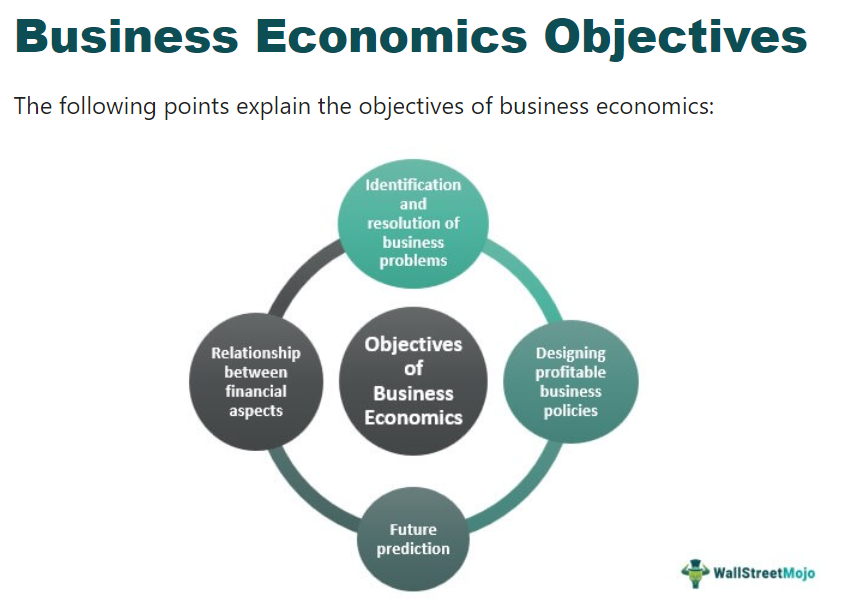Major Challenges Facing Business and Economics in the Post-COVID Era
Major Challenges Facing Business and Economics in the Post-COVID Era
Blog Article
The Duty of Business Economics in Company Technique: Insights for Business Owners
The combination of financial concepts right into business technique is vital for business owners aiming to navigate complex market atmospheres. By comprehending principles such as supply and need, opportunity cost, and market structures, company leaders can craft strategies that not only deal with present market conditions however likewise expect future patterns.
Recognizing Financial Concepts
While several magnate concentrate on operational techniques, a strong understanding of economic concepts is important for informed decision-making and tactical planning. Understanding concepts such as supply and demand, possibility cost, and market structures can critically form a company's technique to competition and resource allowance.
Supply and demand dynamics dictate pricing methods and supply management. As an example, identifying changes in consumer preferences allows businesses to readjust their offerings proactively, enhancing and maximizing sales consumer fulfillment. Chance cost, the worth of the next best different inescapable, encourages leaders to analyze the prospective benefits of different strategic alternatives, making sure resources are alloted successfully.
Furthermore, familiarity with market structures, such as excellent competition, syndicate, and oligopoly, notifies affordable positioning and pricing techniques. A deep understanding of these financial frameworks allows leaders to anticipate market adjustments and respond properly, minimizing dangers and taking advantage of on opportunities.
Inevitably, the integration of financial concepts right into company approach not only assists in better operational choices but likewise cultivates strength in an ever-evolving marketplace. By focusing on financial literacy, entrepreneurs can boost their strategic foresight, ensuring sustainable growth and an one-upmanship.
Market Need Analysis

Recognizing market need aids businesses anticipated sales quantities and readjust their supply monitoring as necessary. It also enables firms to identify market sectors that are underserved or hold significant growth potential (Business and Economics). Additionally, evaluating financial indications and seasonal variations can supply useful context for demand changes over time
Furthermore, a durable market need analysis enables business owners to make enlightened choices regarding product growth and advertising and marketing methods. By aligning their offerings with consumer demand, organizations can improve client satisfaction and commitment.

Prices Strategies and Strategies
Understanding market need not just notifies item offerings but additionally plays a significant function in shaping reliable prices techniques. Business owners have to evaluate customer behavior and readiness to pay, as these elements are vital in developing a price factor that maximizes income while staying attractive to clients.
One commonly utilized pricing approach is value-based prices, where rates are established based on regarded worth instead than price. This technique makes certain that all expenses are covered yet may ignore market conditions.
Dynamic prices is one more ingenious technique, permitting organizations to readjust rates in real-time based on demand changes. This strategy is especially efficient in sectors such as traveling and friendliness, where customer demand differs considerably.
Furthermore, mental pricing, such as setting rates simply listed below a round number (e.g., $9.99 as opposed to $10), can influence consumer assumption and investing in choices. By utilizing a combination of these techniques, business owners can properly place their items out there and optimize profitability.
Competitors and Market Framework
In the realm hop over to these guys of business approach, the nature of competitors and market structure plays a crucial function in figuring out a business's approach to attaining an affordable advantage. Recognizing the characteristics of competition aids entrepreneurs recognize their market placement and tailor strategies as necessary. Market structures can generally be classified as ideal competition, monopolistic competition, oligopoly, and syndicate, each offering distinct obstacles and possibilities.
In a completely affordable market, companies compete primarily on rate, demanding an emphasis on price effectiveness and innovation to preserve margins. Conversely, in monopolistic competitors, distinction with branding and client solution becomes necessary. Oligopolistic markets, characterized by a couple of leading players, call for business to be really aware of competitors' actions, leading to tactical interdependence. Syndicates enable for rates power, but likewise enforce analysis from governing bodies.

Customer Actions Insights
Just how do customer preferences and habits influence business strategies in a competitive landscape? Understanding these characteristics is critical for business owners looking for to get a competitive edge. Consumer actions incorporates the decision-making procedures and actions of individuals when picking, acquiring, and utilizing services or products. By assessing fads, preferences, and purchasing patterns, businesses can customize their offerings to satisfy the developing needs of their target audience.
Data-driven understandings into consumer habits permit business to segment their markets properly, determine key demographics, and establish targeted marketing projects. For instance, businesses can utilize behavioral analytics to prepare for shifts in customer demand and readjust their inventory, rates, or promotional approaches appropriately. This responsiveness not only enhances consumer fulfillment yet additionally i thought about this fosters brand commitment and retention.
Additionally, comprehending customer behavior can notify item development, allowing firms to innovate and produce remedies that resonate with their audience. In a landscape defined by quick modification and intense competition, staying in harmony with consumer preferences is necessary. Ultimately, the ability to adjust organization strategies based on customer understandings can significantly affect a firm's success and sustainability in the market.
Conclusion
In conclusion, the assimilation of economic principles into service approach is important for entrepreneurs aiming to browse intricate market settings - visit homepage Business and Economics. A comprehensive understanding of market demand, prices methods, competitors, and customer actions outfits organizations with the tools necessary to grow and adapt. By leveraging these insights, business owners can make informed choices that line up with market characteristics, eventually improving resilience and advertising lasting development in an ever-evolving affordable landscape
The integration of financial principles into business strategy is essential for entrepreneurs aiming to browse intricate market settings. By realizing ideas such as supply and need, chance cost, and market structures, business leaders can craft approaches that not just attend to present market conditions but also prepare for future fads.A detailed market demand analysis is crucial for organizations intending to enhance their product offerings and rates approaches.In final thought, the combination of economic concepts into business strategy is crucial for business owners aiming to browse complicated market environments. A thorough understanding of market need, prices strategies, competitors, and consumer behavior outfits services with the tools essential to prosper and adapt.
Report this page